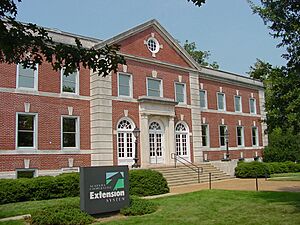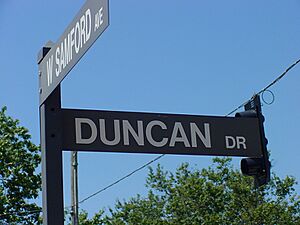Luther Duncan facts for kids
Quick facts for kids
Luther Duncan
|
|
|---|---|
| Born | October 14, 1875 Rockwood, near Russellville, Alabama
|
| Died | July 26, 1947 (aged 71) API, Auburn, Alabama
|
| Education | B.S., M.S., Alabama Polytechnic Institute (now Auburn University) |
| Occupation | 4-H Pioneer Educator Administrator |
| Spouse(s) | Ann Smith |
| Parent(s) | Thomas A. and Margaret (Hargett) Duncan |
Luther Noble Duncan (born October 14, 1875 – died July 26, 1947) was an important American educator and leader in the 1900s. He helped start the 4-H youth program. He also led the Alabama Extension Service and later became the president of the Alabama Polytechnic Institute, which is now known as Auburn University.
Contents
Early Life and Education
Luther Duncan was born near Russellville, Alabama in Franklin County, Alabama. In 1896, he started college at Alabama Polytechnic Institute (API) in Auburn, Alabama. He became a strong student leader there. To pay for college, he taught at a small country school during the summers. He earned $25 a month.
After graduating, Duncan taught for a short time in his home county. Then, he took a job as an instructor at an agricultural school in Wetumpka, Alabama. He worked in several teaching jobs across Alabama. Later, he returned to Auburn. There, he worked as an instructor and researcher. He worked under a famous agricultural scientist named J.F. Duggar.
Starting Extension Work
Duncan's work at API took him to almost every county in Alabama. He worked with farmers and learned about a new way of teaching. This informal teaching method later became known as Cooperative Extension work. He was greatly inspired by Seaman A. Knapp, who was a pioneer in this field. During this time, Duncan also earned his master's degree from API in 1907.
Duncan became a professor of Extension in API's agriculture school. He worked for both API and the U.S. Department of Agriculture. His job was to be a "demonstration expert." He organized demonstrations at schools and farms. He wanted to encourage young people and adults to use new farming methods. These methods were developed at API and other universities.
How Did Luther Duncan Help Start 4-H?
In this role, Duncan played a big part in organizing boys' clubs, also called corn clubs. These clubs later joined with girls' clubs to form what we now know as 4-H. By 1909, Alabama had over 2,000 corn club members. By 1911, this number grew to 10,000 members!
Duncan also helped farmers grow different crops and animals. He promoted raising hogs and poultry (like chickens). This was in addition to growing cotton, peanuts, and tomatoes. This helped Alabama farmers have more options.
In 1915, the Smith-Lever Act was passed. This law officially created Cooperative Extension work across the nation. Duncan became the superintendent of Junior and Home Economics Extension. His mentor, J.F. Duggar, became the director of the new Alabama Extension Service. Duncan took over as director of the Alabama Extension Service in 1920.
Leading the Alabama Extension Service
Luther Duncan helped build the Alabama Extension Service. He made sure that API, Alabama's first land-grant university, was in charge of the Extension's mission. Before this, the U.S. Department of Agriculture led most of the efforts.
The Extension Service first focused on helping farmers during tough economic times. Duncan hired specialists who worked across the state. These specialists gave agents in the field the latest research-based information. Duncan also used new technology. He bought a 1,000-watt radio station to broadcast educational information to farmers.
Duncan was known as a leader who expected the best from his employees. He wanted them to be mature and earn the trust of farmers. He also expected them to have "unbounded energy, zeal, optimism, enthusiasm and persistency." He believed these habits showed "the very highest character."
He once said, "A man entering upon his duties of the day without a shave or with a dirty collar…will never get very far with what he represents." This shows how much he valued professionalism.
President of Auburn University
Duncan had a strong reputation for managing large organizations with small budgets. Because of this, many business leaders wanted him to become president of API in 1932. This was during the Great Depression, a time when money was very tight. They felt API needed his careful management style.
However, some people criticized Duncan because of his past ties to the Farm Bureau. A newspaper publisher named Victor Hanson even started a campaign against him. The API trustees couldn't agree on a new president. So, they formed a three-person committee, including Duncan, to manage the school temporarily.
Duncan's smart financial decisions during this difficult time eventually won over most of the trustees. He became the president of API in 1935.
What Was Duncan's Legacy as President?
Duncan is remembered as a strong advocate for API. He fought hard to get what he believed was API's fair share of state funding. He supported cooperation among Alabama's colleges. But he also stressed that this cooperation should not hurt API.
For example, Duncan believed that the way the state's Teacher-Training Equalization Fund was used unfairly favored the University of Alabama. He felt it made API seem like a "second-class" institution.
Working with Governor Bibb Graves, U.S. Senator John H. Bankhead, and E.A. O'Neal (president of the American Farm Bureau), Duncan helped pass the Bankhead-Jones Act. This law increased funding for teaching, agricultural research, and agricultural extension.
Duncan also believed that every student in Alabama should get the same amount of state support, no matter which college they attended. He wanted colleges to work together to recruit students. He also suggested that Alabama and API should focus on the areas they were best at. This way, they could provide the "maximum service."
Sadly, much of his vision was not fully achieved during his lifetime due to strong opposition.
Near the end of his career, Duncan faced another challenge. The new governor, James "Big Jim" Folsom, and a trustee named Gould Beech, argued that farming in Alabama was struggling. They claimed this was partly due to the Alabama Extension Service. They also said the Extension Service was too involved in politics with the Farm Bureau.
Duncan was unable to finish this fight. He died unexpectedly in the President's Mansion on July 26, 1947.
Legacy
Even today, Luther Duncan is a notable figure in Alabama history. He is best remembered for making the Alabama Extension Service and API powerful forces in the state. Many people see him as a visionary leader and a reformer. He was an early supporter of fair funding for all colleges in Alabama. He also never hesitated to fight for what he believed was API's rightful share.
Images for kids
 | Bayard Rustin |
 | Jeannette Carter |
 | Jeremiah A. Brown |





